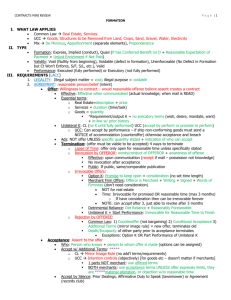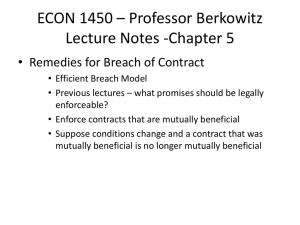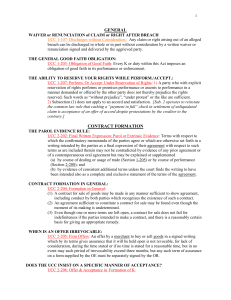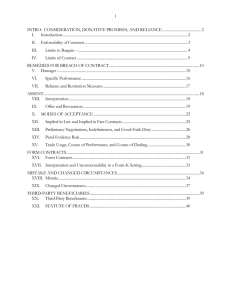Contract Law Flowchart
advertisement
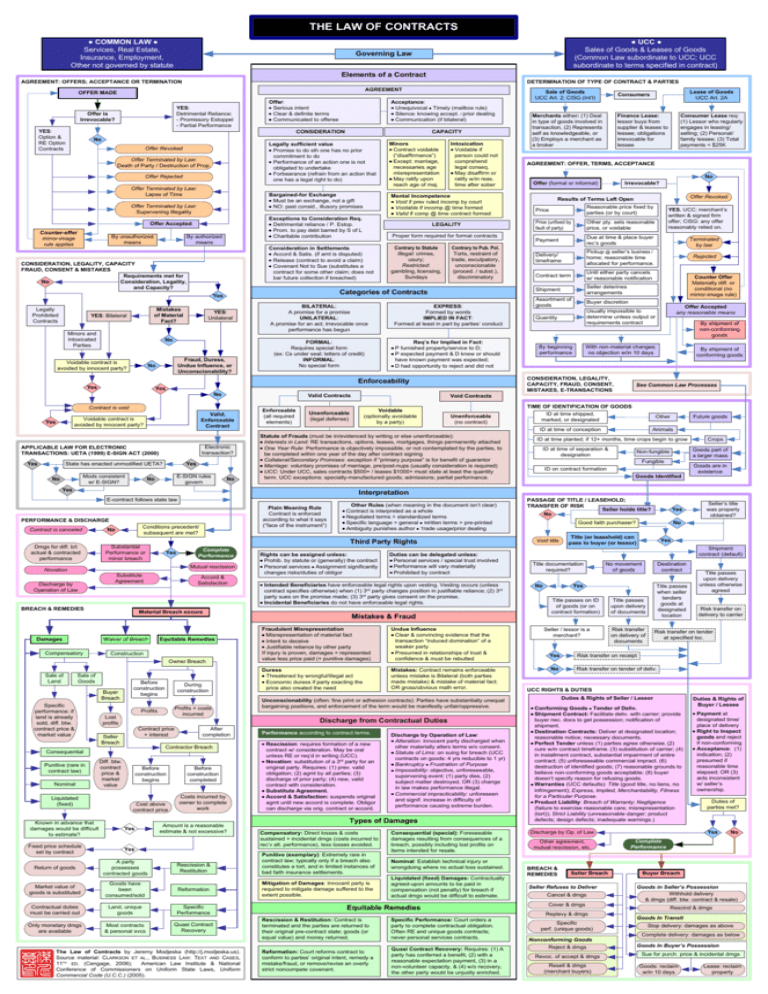
THE LAW OF CONTRACTS ● COMMON LAW ● Services, Real Estate, Insurance, Employment, Other not governed by statute ● UCC ● Sales of Goods & Leases of Goods (Common Law subordinate to UCC; UCC subordinate to terms specified in contract) Governing Law Elements of a Contract AGREEMENT: OFFERS; ACCEPTANCE OR TERMINATION DETERMINATION OF TYPE OF CONTRACT & PARTIES AGREEMENT OFFER MADE YES: Detrimental Reliance: - Promissory Estoppel - Partial Performance Offer is Irrevocable? YES: Option & RE Option Contracts Offer: Serious intent Clear & definite terms Communicated to offeree Acceptance: Unequivocal ● Timely (mailbox rule) Silence: knowing accept. / prior dealing Communication (if bilateral) CONSIDERATION CAPACITY No Legally sufficient value Promise to do sth one has no prior commitment to do Performance of an action one is not obligated to undertake Forbearance (refrain from an action that one has a legal right to do) Offer Revoked Offer Terminated by Law: Death of Party / Destruction of Prop. Offer Rejected Offer Terminated by Law: Lapse of Time Bargained-for Exchange Must be an exchange, not a gift NO: past consid., illusory promises Offer Terminated by Law: Supervening Illegality Offer Accepted Counter-offer mirror-image rule applies By unauthorized means By authorized means CONSIDERATION, LEGALITY, CAPACITY FRAUD, CONSENT & MISTAKES Requirements met for No Consideration, Legality, and Capacity? Mistakes of Material Fact? YES: Bilateral Minors and Intoxicated Parties YES: Unilateral Fraud, Duress, Undue Influence, or Unconscionability? No Mental Incompetence Void if prev ruled incomp by court Voidable if incomp @ time formed Valid if comp @ time contract formed Proper form required for formal contracts Consideration in Settlements Accord & Satis. (if amt is disputed) Release (contract to avoid a claim) Covenant Not to Sue (substitutes a contract for some other claim; does not bar future collection if breached) Contrary to Statute Illegal: crimes, usury; Restricted: gambling, licensing, Sundays LEGALITY Contrary to Pub. Pol. Torts, restraint of trade, exculpatory, unconscionable (proced. / subst.), discriminatory Categories of Contracts No Voidable contract is avoided by innocent party? Intoxication Voidable if person could not comprehend legal conseq. May disaffirm or ratify w/in reas. time after sober Exceptions to Consideration Req. Detrimental reliance / P. Estop. Prom. to pay debt barred by S of L Charitable contribution Yes Legally Prohibited Contracts Minors Contract voidable (“disaffirmance”) Except: marriage, necessaries, age misrepresentation May ratify upon reach age of maj. BILATERAL: A promise for a promise UNILATERAL: A promise for an act; irrevocable once performance has begun EXPRESS: Formed by words IMPLIED IN FACT: Formed at least in part by parties’ conduct FORMAL: Requires special form (ex: Cs under seal; letters of credit) INFORMAL: No special form Req’s for Implied in Fact: P furnished property/service to D; P expected payment & D knew or should have known payment was expected; D had opportunity to reject and did not Yes No Valid Contracts Contract is void Valid, Enforceable Contract Voidable contract is avoided by innocent party? Yes Electronic transaction? APPLICABLE LAW FOR ELECTRONIC TRANSACTIONS: UETA (1999) E-SIGN ACT (2000) State has enacted unmodified UETA? Yes Mods consistent w/ E-SIGN? No Yes E-SIGN rules govern No No Enforceable (all required elements) Voidable (optionally avoidable by a party) Consumer Lease req: (1) Lessor who regularly engages in leasing/ selling; (2) Personal/ family lessee; (3) Total payments < $25K Finance Lease: lessor buys from supplier & leases to lessee; obligations irrevocable for lessee AGREEMENT: OFFER, TERMS, ACCEPTANCE No Offer (formal or informal) Irrevocable? Offer Revoked Results of Terms Left Open Price Reasonable price fixed by parties (or by court) Price (unfixed by fault of party) Other pty. sets reasonable price, or voidable Payment Due at time & place buyer rec’s goods Terminated by law Delivery/ timeframe Pickup @ seller’s business / home; reasonable time allocated for performance. Rejected Contract term Until either party cancels w/ reasonable notification Shipment Seller deterines arrangements Assortment of goods Buyer discretion Quantity Usually impossible to determine unless output or requirements contract By beginning performance YES. UCC: merchant’s written & signed firm offer; CISG: any offer reasonably relied on. Counter Offer Materially diff. or conditional (no mirror-image rule) Offer Accepted any reasonable means By shipment of non-conforming goods With non-material changes; no objection w/in 10 days By shipment of conforming goods See Common Law Processes TIME OF IDENTIFICATION OF GOODS Unenforceable (no contract) Statute of Frauds (must be in/evidenced by writing or else unenforceable): Interests in Land: RE transactions, options, leases, mortgages, things permanently attached One Year Rule: Performance is objectively impossible, or not contemplated by the parties, to be completed within one year of the day after contract signing Collateral/Secondary Promises: exception if “primary purpose” is for benefit of guarantor Marriage: voluntary promises of marriage, pre/post-nups (usually consideration is required) UCC: Under UCC, sales contracts $500+ / leases $1000+ must state at least the quantity term. UCC exceptions: specially-manufactured goods; admissions; partial performance. ID at time shipped, marked, or designated Other ID at time of conception Animals Future goods ID at time planted; if 12+ months, time crops begin to grow ID at time of separation & designation Crops Goods part of a larger mass Non-fungible Fungible ID on contract formation Goods Identified Goods are in existence Interpretation E-contract follows state law Plain Meaning Rule Contract is enforced according to what it says (“face of the instrument”) PERFORMANCE & DISCHARGE Contract is canceled Dmgs for diff. b/t actual & contracted performance Conditions precedent/ subsequent are met? No Yes Complete Performance Mutual rescission Discharge by Operation of Law Substitute Agreement BREACH & REMEDIES Damages Compensatory Accord & Satisfaction Material Breach occurs Waiver of Breach Equitable Remedies Construction Owner Breach Sale of Goods Buyer Breach Specific performance; if land is already sold, diff. btw. contract price & market value Before construction begins During construction Profits Profits + costs incurred Lost profits Nominal Liquidated (fixed) Known in advance that damages would be difficult to estimate? Fixed price schedule set by contract Return of goods Rights can be assigned unless: Prohib. by statute or (generally) the contract Personal services ● Assignment significantly changes risks/duties of obligor Duties can be delegated unless: Personal services / special trust involved Performance will vary materially Prohibited by contract Intended Beneficiaries have enforceable legal rights upon vesting. Vesting occurs (unless contract specifies otherwise) when (1) 3rd party changes position in justifiable reliance; (2) 3rd party sues on the promise made; (3) 3rd party gives consent on the promise. Incidental Beneficiaries do not have enforceable legal rights. Mistakes & Fraud Fraudulent Misrepresentation Misrepresentation of material fact Intent to deceive Justifiable reliance by other party If injury is proven, damages = represented value less price paid (+ punitive damages) Undue Influence Clear & convincing evidence that the transaction “induced domination” of a weaker party Presumed in relationships of trust & confidence & must be rebutted Duress Threatened by wrongful/illegal act Economic duress if party exacting the price also created the need Mistakes: Contract remains enforceable unless mistake is Bilateral (both parties made mistake) & mistake of material fact; OR gross/obvious math error. Unconscionability (often: fine print or adhesion contracts): Parties have substantially unequal bargaining positions, and enforcement of the term would be manifestly unfair/oppressive. Discharge from Contractual Duties Contract price + interest Seller Breach After completion Contractor Breach Consequential Punitive (rare in contract law) Other Rules (when meaning in the document isn’t clear) Contract is interpreted as a whole Negotiated terms > standardized terms Specific language > general ● Written terms > pre-printed Ambiguity punishes author ● Trade usage/prior dealing Third Party Rights Substantial Performance or minor breach Novation Sale of Land Merchants either: (1) Deal in type of goods involved in transaction, (2) Represents self as knowledgeable, or (3) Employs a merchant as a broker Void Contracts Unenforceable (legal defense) Yes Lease of Goods UCC Art. 2A Consumers CONSIDERATION, LEGALITY, CAPACITY, FRAUD, CONSENT, MISTAKES, E-TRANSACTIONS Enforceability Yes Sale of Goods UCC Art. 2; CISG (Int’l) Diff. btw. contract price & market value Before construction begins Before construction completed Cost above contract price Costs incurred by owner to complete work Yes Amount is a reasonable estimate & not excessive? Performance according to contract terms. Rescission: requires formation of a new contract w/ consideration. May be oral unless RE or req’d in writing (UCC). Novation: substitution of a 3rd party for an original party. Requires: (1) prev. valid obligation; (2) agmt by all parties; (3) discharge of prior party; (4) new, valid contract with consideration. Substitute Agreement. Accord & Satisfaction: suspends original agmt until new accord is complete. Obligor can discharge via orig. contract or accord. Types of Damages Compensatory: Direct losses & costs sustained + incidental dmgs (costs incurred to rec’v alt. performance), less losses avoided. Yes A party possesses contracted goods Rescission & Restitution Market value of goods is substituted Goods have been consumed/sold Reformation Contractual duties must be carried out Land, unique goods Specific Performance Only monetary dmgs are available Most contracts & personal svcs Quasi Contract Recovery The Law of Contracts by Jeremy Modjeska (http://j.modjeska.us). Source material: CLARKSON ET AL., BUSINESS LAW: TEXT AND CASES, 11TH ED. (Cengage, 2008); American Law Institute & National Conference of Commissioners on Uniform State Laws, Uniform Commercial Code (U.C.C.) (2005). Discharge by Operation of Law: Alteration: innocent party discharged when other materially alters terms w/o consent. Statute of Lims: on suing for breach (UCC contracts on goods: 4 yrs reducible to 1 yr) Bankruptcy ● Frustration of Purpose Impossibility: objective, unforeseeable, supervening event: (1) party dies, (2) subject matter destroyed, OR (3) change in law makes performance illegal. Commercial impracticability: unforeseen and signif. increase in difficulty of performance causing extreme burden. Punitive (exemplary): Extremely rare in contract law; typically only if a breach also constitutes a tort, and in limited instances of bad faith insurance settlements. Mitigation of Damages: Innocent party is required to mitigate damage suffered to the extent possible. Consequential (special): Foreseeable damages resulting from consequences of a breach, possibly including lost profits on items intended for resale. Nominal: Establish technical injury or wrongdoing where no actual loss sustained. Liquidated (fixed) Damages: Contractually agreed-upon amounts to be paid in compensation (not penalty) for breach if actual dmgs would be difficult to estimate. Equitable Remedies PASSAGE OF TITLE / LEASEHOLD; TRANSFER OF RISK Seller holds title? No Good faith purchaser? Void title Specific Performance: Court orders a party to complete contractual obligation. Often RE and unique goods contracts; never personal services contracts. Reformation: Court reforms contract to conform to parties’ original intent, remedy a mistake/fraud, or remove/revise an overly strict noncompete covenant. Quasi Contract Recovery: Requires: (1) A party has conferred a benefit, (2) with a reasonable expectation payment, (3) in a non-volunteer capacity, & (4) w/o recovery, the other party would be unjustly enriched. Seller’s title was properly obtained? No Title (or leasehold) can pass to buyer (or lessor) Yes Shipment contract (default) Title documentation required? No Destination contract No movement of goods Title passes when seller tenders goods at designated location Yes Title passes on ID of goods (or on contract formation) Seller / lessor is a merchant? Title passes upon delivery of documents Risk transfer on delivery of documents Title passes upon delivery unless otherwise agreed Risk transfer on delivery to carrier Risk transfer on tender at specified loc. Yes Risk transfer on receipt No Risk transfer on tender of deliv. UCC RIGHTS & DUTIES Duties & Rights of Seller / Lessor Conforming Goods ● Tender of Deliv. Shipment Contract: Facilitate deliv. with carrier; provide buyer nec. docs to get possession; notification of shipment. Destination Contracts: Deliver at designated location; reasonable notice; necessary documents. Perfect Tender unless (1) parties agree otherwise, (2) cure w/in contract timeframe, (3) substitution of carrier; (4) in installment contract, substantial impairment of entire contract; (5) unforeseeable commercial impract. (6) destruction of identified goods; (7) reasonable grounds to believe non-conforming goods acceptable; (8) buyer doesn’t specify reason for refusing goods. Warranties (UCC defaults): Title (good title, no liens, no infringement); Express, Implied, Merchantability, Fitness for a Particular Purpose. Product Liability: Breach of Warranty; Negligence (failure to exercise reasonable care; misrepresentation (tort)); Strict Liability (unreasonable danger; product defects; design defects; inadequate warnings.) Discharge by Op. of Law Other agreement, mutual rescission, etc. BREACH & REMEDIES Seller Breach Seller Refuses to Deliver Cancel & dmgs Cover & dmgs Replevy & dmgs Rescission & Restitution: Contract is terminated and the parties are returned to their original pre-contract state; goods (or equal value) and money returned. Yes Specific perf. (unique goods) Duties & Rights of Buyer / Lessee Payment at designated time/ place of delivery Right to Inspect goods and reject if non-conforming Acceptance: (1) indication; (2) presumed if reasonable time elapsed; OR (3) acts inconsistent w/ seller’s ownership. Duties of parties met? Yes No Complete Performance Buyer Breach Goods in Seller’s Possession Withhold delivery & dmgs (diff. btw. contract & resale) Rescind & dmgs Goods In Transit Stop delivery: damages as above Complete delivery: damages as below Nonconforming Goods Reject & dmgs Revoc. of accept & dmgs Resell & dmgs (merchant buyers) Goods In Buyer’s Possession Sue for purch. price & incidental dmgs Goods: reclaim w/in 10 days Lease: reclaim property
